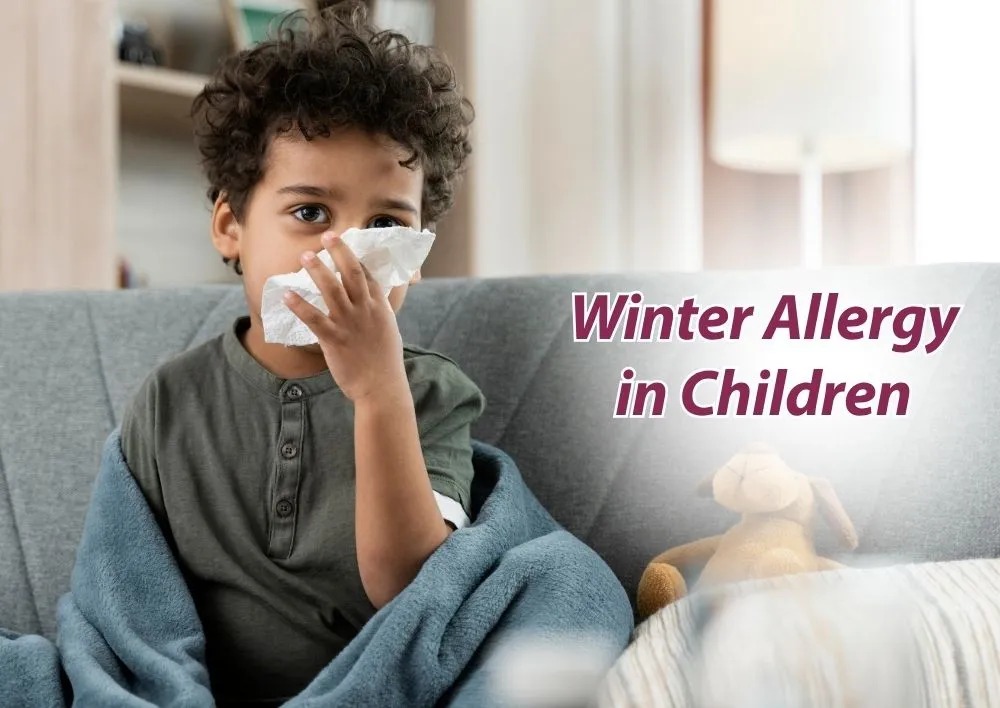5 Ways to Protect Your Child from Winter Allergies Every Parent Should Know
Summary
Winter brings cozy sweaters, warm soups, and festive cheer, but for many children, it also brings sneezing, coughing, itchy eyes, and stubborn nasal congestion. Winter allergies are common, especially when kids spend more time indoors, surrounded by dust mites, pet dander, mold, and dry air.
As parents, it is natural to worry when your child starts showing symptoms like a runny nose, watery eyes, or breathing difficulty. With the right preventive steps, you can protect your child from winter allergy and help them enjoy the winter season comfortably.
We will discuss five effective ways to protect children from winter allergies, along with simple, actionable tips every parent can follow.
1. Keep Indoor Air Clean and Moisturized
Winter air is naturally dry, and indoor heaters reduce humidity even more. This dry air irritates the nasal passages and worsens allergy symptoms in children.
Dr. Rahul Aggarwal, senior pediatrician in Gurgaon at Miracles Apollo Cradle, explains that dry indoor air makes it harder for children to breathe comfortably, so maintaining the right moisture level at home becomes very important during winter.
What You Can Do
-
Use a humidifier to keep the air moist and comfortable for your child.
-
Maintain humidity levels between 40 and 50 percent to avoid mold growth.
-
Open windows for 10–15 minutes everyday to allow fresh air circulation.
-
Avoid using incense sticks, strong perfumes, or aerosol sprays as they can trigger allergies.
Pro Tip: Clean the humidifier regularly to prevent bacterial or mold buildup.
2. Reduce Exposure to Indoor Allergens
Most winter allergies are caused by indoor allergens that accumulate in enclosed spaces.
How to Control Indoor Allergens
-
Dust your home frequently using a damp cloth to prevent dust from spreading into the air.
-
Vacuum carpets, sofas, and curtains at least twice a week to reduce dust mites.
-
Wash bedding in hot water every week since dust mites cannot survive high temperatures.
-
Use allergen-proof covers for pillows and mattresses.
-
Limit the number of stuffed toys in your child’s room. If your child loves them, wash them regularly in hot water.
For Pet Owners:
If your child is allergic to pet dander, keep pets away from the child’s bedroom and groom them frequently.
3. Strengthen Your Child’s Immune System with Nutrition
A healthy immune system helps children fight irritation caused by winter allergens.
Healthy Foods for Winter Allergy Protection
-
Include vitamin C-rich foods like oranges, kiwi, amla, strawberries, and tomatoes.
-
Serve warm soups and broths to keep the respiratory system soothed.
-
For children above one year, a teaspoon of honey can help relieve throat irritation.
-
Turmeric milk helps reduce inflammation naturally.
-
Dry fruits such as almonds and walnuts support immunity and overall health.
4. Stay Hydrated
Children often drink less water during winter, which can thicken mucus and worsen congestion. Offer warm water, homemade kadha for older children, or coconut water to keep them hydrated.
5. Maintain Good Hygiene and Clean Habits
Good hygiene plays a major role in reducing the chances of allergic reactions during winter.
Teach Children These Habits
-
Wash hands frequently, especially after playing or touching surfaces.
-
Avoid rubbing the eyes, as it spreads allergens and causes redness or irritation.
-
Use separate towels for each family member to prevent cross-contamination.
-
Keep nails short and clean, as dirt and allergens can accumulate under them.
6. Regular Bathing Helps
A warm bath helps remove allergens from the skin and hair, reduces irritation, and improves sleep quality at night.
7. Keep Kids Warm and Covered
Cold air irritates the nasal lining, which makes children more sensitive to allergens and infections.
How to Keep Your Child Warm
-
Dress them in layers instead of one heavy jacket, as layers trap heat more effectively.
-
Cover their nose and mouth with a scarf while stepping outside.
-
Ensure woolens are comfortable and do not irritate the skin.
-
Use cotton layers under woolen clothes to prevent itching or rashes.
8. Avoid Sudden Temperature Changes
Switching from cold outdoor air to heated indoor air too quickly can trigger allergy symptoms. Allow your child to acclimate for a minute after coming inside.
Additional Tips To Manage Winter Allergy in Children
-
Keep your home mold-free by checking damp areas like bathrooms, window corners, and storerooms.
-
Encourage outdoor play, but avoid going out early in the morning or late evening when the temperature is very low.
-
Consult a pediatrician if symptoms like coughing, breathing problems, rashes, or prolonged congestion continue for more than two to three weeks.
-
Early diagnosis and treatment can prevent complications such as sinus infections or asthma flare-ups.
What Causes Winter Allergies in Children?
During winter, children spend more time indoors, which increases their exposure to certain common allergens such as:
-
Dust mites
-
Pet dander
-
Mold spores
-
Dry indoor air
-
Indoor pollutants like air fresheners, incense, or smoke
These triggers can cause allergy symptoms that often resemble a common cold. If symptoms persist for more than two weeks, it may indicate allergies rather than an infection.
Conclusion:
Winter allergies can affect your child’s comfort, sleep patterns, and daily activities. But with simple steps like improving indoor air quality, maintaining hygiene, reducing allergens, boosting nutrition, and keeping them warm, you can protect your child during the cold season.
If symptoms keep returning or seem severe, consulting a pediatrician near you is the safest way to ensure your child receives the right care.
Frequently Asked Questions
Keep the home clean, reduce dust and allergens, maintain good hygiene, and support your child’s immunity with healthy food and proper hydration.
Identify the trigger, keep the air clean, give prescribed antihistamines, and ensure your child rests in a dust-free environment.
Allergies develop when a child’s immune system overreacts to triggers like dust, pollen, pet dander, mold, or certain foods.
Allergies can be genetic and may come from either parent, increasing the child’s chances if one or both parents are allergic.
Miracles Healthcare is one of the best places in Gurgaon for winter allergy treatment in children, offering expert pediatric care and advanced diagnostic support.





.webp)









Was the information useful?
0 0